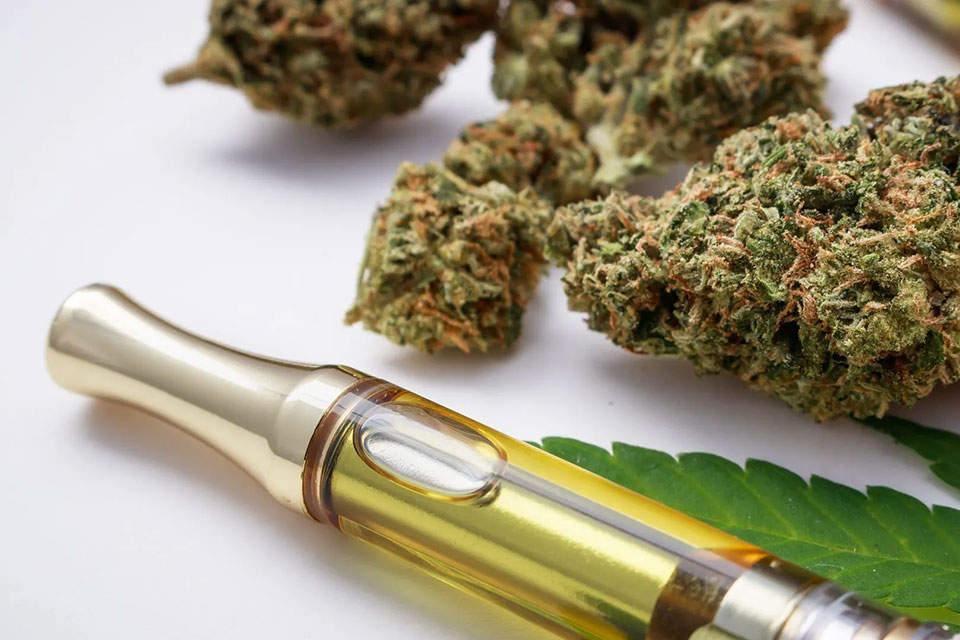This article is reprinted with permission from Crain’s Detroit Business.
Shenzhen, China, is more than 7,800 miles from Michigan. But the location of the mainland city of 17.6 million people is about to be a big problem for that state’s legal cannabis market.
Manufacturers in the city produce all of the hardware for vapes — a popular product category, as Michigan cannabis operators sold an eye-watering 53.83 million vapes last year, according to data from industry analysis firm Headset.
Vape hardware suppliers are now swept up in President Donald Trump’s sweeping international tariffs, as the president slapped a 145% retaliatory tariff on products made in China and imported to the U.S.
“I don’t even know of a supplier that’s not in Shenzen,” said Ryan Ratzloff, founder and CEO of Lansing-based cannabis processor Lion Labs. “Our margins are as tight as can be and barely make any money in that category. So we’re not going to eat the costs, we’re going to jack up the price.”
Lion Labs, which sold 200,000 cannabis vapes last year under its high-end Element brand name, sources its vape hardware from Seattle-based Active Vapor Devices, one of the largest importers in the sector.
Lion Labs pays $3.50 per vape hardware and puts its live rosin cannabis oil in the hardware, packages the product and distributes to dispensaries. Ratzloff said it’s a thin margin for the product, even though Element’s vape products retail for upwards of $40 and a 145% additional cost on the product would push Lion Labs’ sourcing to $8.57 per unit.
That translates to an additional $1.02 million in costs.
For House Brands Distro, the processor for Detroit-based House of Dank, the costs go even higher.
The brand produces around 500,000 vapes a month, said Travis Murphy, a buyer for company. Even if they sourced their hardware from China for $1 each, the additional cost would be $1.23 million per month, or nearly $15 million annually.
Ultimately, those costs would be passed down to the consumer. In March, the average cost of a cannabis vape was just $9.37, the lowest cost on record. If the average cost to import vape hardware $2 per unit, that cost rises to $4.90, pushing the consumer price in accordance to $12.27 after the tariff.
In the meantime, the industry is negotiating with suppliers and trying to find ways to cut costs to help absorb some of the tariff costs.
Ratzloff said Active imported as much vape inventory as possible ahead of the April 9 effective date of the tariffs.
Murphy said suppliers had been pressuring him to take similar steps.
“It’s all up in the air,” Murphy said. “So far we haven’t seen a rise in costs from the tariffs. We don’t know if they (suppliers) will absorb them or not. Right now the biggest adjustment is the level of priority we’re giving to ordering and trying to get goods in country before it gets worse.”
But, ultimately, it’s unclear how much pricing will be impacted.
All sides of the industry are waiting to Trump or China President Xi Jinping to blink and avert the coming chaos of a trade war.
Robin Schneider, executive director of the Michigan Cannabis Industry Association, told Crain’s many of its members have secured assurances from their suppliers in Shenzhen that they would absorb the tariff cost.
“So far several vape hardware and packaging suppliers have reassured our members that the factories will be paying for the tariffs,” Schneider wrote in an email. “With that said it’s too early in the process to predict the financial impact tariffs will have on our industry.”
How long that grace lasts is unclear.
Ratzloff said Lion Labs isn’t waiting around to find out. It’s already looking to change its vape packaging, which is also largely imported, to cut costs.
Changing from a box for its Element vapes to a Mylar package with a sticker will save Lion Labs $100,000 a year, Ratzloff said.
But Ratzloff worries the additional costs, if and when they are passed down, will cause the already financially stressed industry to further cut corners and create a lower quality, and potentially dangerous, product.
Adult-use marijuana prices have plummeted 28% since March 2024 to an average cost of just $65.14 for an ounce of marijuana flower. Three years ago, the average price of an ounce was $184.90.
Many fear the industry is turning to less scrupulous means to make ends meet, including using illicit product or unapproved chemicals in their vapes. For instance, state regulators recalled in January 16,000 Platinum vape cartridges that contained the banned medium-chain triglyceride, or MCT oil, made by RWB Michigan, a subsidiary of multi-state operator Red White & Bloom Brands.
Processors may illegally use MCT oil in their distillate to increase margins by lowering the amount of distillate, which is created by dissolving expensively grown cannabis.
“If you’re on the ropes, you’re going to have to do something and it’s cut corners,” Ratzloff said. “This is going to end up with the customer paying more and getting a less quality product.”
[[{“value”:”Concerns abound that the effect on the already financially stressed industry could be more cut corners, higher risk.
The post Cannabis vape companies hit hard by tariffs – compounding headwinds in Michigan appeared first on Green Market Report.”}]] Read More


